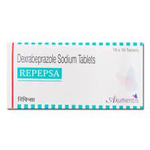dirab
Introduction to Dirab
Dirab is a medication designed to provide relief from various gastrointestinal conditions. It primarily targets issues related to excessive stomach acid production. With its active ingredient, Dexrabeprazole, Dirab offers an effective solution for conditions such as gastroesophageal reflux disease (GERD) and peptic ulcers. Available in the form of tablets, Dirab is easy to administer and is formulated to ensure optimal absorption in the body. By reducing acid production, it helps in healing the esophagus and preventing further damage. Always consult a healthcare professional before starting Dirab to ensure it's the right option for your condition.
Composition of Dirab
Dirab contains the active ingredient Dexrabeprazole, a potent proton pump inhibitor (PPI). Dexrabeprazole works by blocking the proton pump in the stomach lining, which is responsible for the secretion of gastric acid. By inhibiting this process, Dexrabeprazole effectively reduces the amount of acid produced, providing relief from acid-related discomfort and allowing healing of the affected areas. This mechanism makes Dirab a reliable choice for managing acid-related gastrointestinal disorders.
Uses for Dirab
- Management of gastroesophageal reflux disease (GERD)
- Treatment of peptic ulcers
- Relief from Zollinger-Ellison syndrome
- Prevention of acid-related damage in the esophagus
- Reduction of stomach acid production
Side Effects of Dirab
- Headache
- Nausea
- Diarrhea
- Abdominal pain
- Dizziness
- Flatulence
- Constipation
Precautions for Dirab
Before taking Dirab, inform your healthcare provider about any existing medical conditions, allergies, or medications you are currently taking. This is crucial to avoid potential interactions or side effects. Dirab is not recommended for individuals with a known allergy to Dexrabeprazole or other PPIs. Pregnant or breastfeeding women should consult their doctor before using this medication. It is also important to adhere to the prescribed dosage and not to exceed the recommended amount, as this could lead to adverse effects.
Specifications of Dirab
Dirab is available in tablet form, with each tablet containing 10mg of Dexrabeprazole. Currently, Dirab is not available as an injection, syrup, or capsule. The tablet form is designed for easy oral administration and ensures effective delivery of the active ingredient to the target site in the gastrointestinal tract.
Conclusion
Dirab, with its active ingredient Dexrabeprazole, offers an effective solution for managing acid-related gastrointestinal conditions. By reducing stomach acid production, it provides relief from discomfort and promotes healing. While Dirab is generally well-tolerated, it is important to use it under the guidance of a healthcare professional to ensure safety and efficacy. Always follow the prescribed dosage and be mindful of potential side effects. With proper use, Dirab can significantly improve quality of life for those suffering from acid-related disorders.
Similar Medicines
Available in 2 variations

Dirab 10mg Tablet
Dirab 10mg Tablet
Dexrabeprazole (10mg)
strip of 10 tablets

Dirab 5mg Tablet
Dirab 5mg Tablet
Dexrabeprazole (5mg)
strip of 10 tablets
Related Faqs

Is it safe to use Dexpure for a long period of time?
Dexpure should be used for as long as it has been prescribed by your doctor. Dexpure is usually considered to be safe when taken in the recommended dose and duration. If Dexpure is used for more than 3 months, certain long term side effects may be seen. The most important of these is low magnesium levels in your blood which may make you feel tired, confused, dizzy, shaky or dizzy. You may also have muscle twitches or irregular heartbeat. If the use is further prolonged for more than a year, you may have an increased risk of bone fractures, stomach infections, subacute cutaneous lupus erythematosus, osteoporosis, and vitamin B12 deficiency.

What are the serious side effects of Dirab that I should know about?
The serious side effects of Dirab are rare. There may be severe allergic reactions (such as blisters on the skin, fever, generalised swelling, wheezing, or difficulty swallowing), impairment of liver function and kidney damage. Consult your doctor right away if you develop decreased urination, edema (swelling due to fluid retention), lower back pain, nausea, fatigue, and rash or fever. These could be signs of a kidney problem. You may have severe diarrhea due to an intestinal infection caused by a microorganism known as clostridium difficile. If you notice persistent watery stools, stomach pain or fever, please contact your doctor immediately. Prolonged use of Dirab can lead to low magnesium levels in your blood which may make you feel tired, confused, dizzy, shaky or dizzy. You may also have muscle twitches or irregular heartbeat. If the use is further prolonged for more than a year, you may have an increased risk of bone fractures, stomach infections and vitamin B12 deficiency.

What is Acerab used for?
Acerab is used for the treatment of stomach and intestinal ulcers (gastric and duodenal ulcers), reflux esophagitis or gastroesophageal reflux disease (GERD). It works by reducing the amount of acid made by your stomach and thus relieves your symptoms. Acerab also prevents acidity associated with use of painkillers and stress ulcers in critically ill people. It is also used to treat a disease associated with excessive acid production in the stomach known as Zollinger Ellison syndrome (ZES).
Related Posts

1:15
Which High-Fiber Foods Improve Digestion? Best Fiber Sources!

1:15
Roti vs Rice – Which One Is Healthier and Better for Weight Loss?

1:15
Which Foods Are Packed with Vitamin E? Boost Your Health with These Superfoods!

1:15
Vaginal Fart: Symptoms, Causes, Prevention and More!

1:15
Home Remedies for Dry Cough | Best Foods & Tips for Fast Relief!
Disclaimer : This information is not a substitute for medical advice. Consult your healthcare provider before making any changes to your treatment . Do not ignore or delay professional medical advice based on anything you have seen or read on Medwiki.
dirab
Prescription Required
Manufacturer :
Hetero Drugs LtdComposition :
Dexrabeprazole (10mg)

















.svg)
